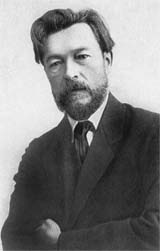presents
 Shishkov, Vyacheslav Yakolevich.. Born on 3 October 1873 in the town of Bezhetsk, Tver region. His father was a merchant, but suffered a business setback and became a shop assistant working for other local merchants. Shishkov studied in the local school and, from a very early age, showed a talent for writing. At age 11 he wrote The Wolf's Lair, a story of robbers.
Shishkov, Vyacheslav Yakolevich.. Born on 3 October 1873 in the town of Bezhetsk, Tver region. His father was a merchant, but suffered a business setback and became a shop assistant working for other local merchants. Shishkov studied in the local school and, from a very early age, showed a talent for writing. At age 11 he wrote The Wolf's Lair, a story of robbers.Shishkov went on to study civil engineering at the Vyshnevolotskoe Technical School, from which he graduated in 1891. He worked in the Novgorod and Vologosky regions, then, in 1894, went to work in the Tomsk region of Siberia, where he was to stay for 20 years. He traveled the regional waterways, measuring and making maps of the Enisei, Irtysh, Ob, Lena, Biya, Katun, Chulym, Angara, and Lower Tungusk. His travels brought him in contact not only with the varied wonders of Siberia, but also the many strata of society there: workers, peasants, gold miners, criminals, wandering bums, political exiles, sectarians. In 1908, the astounding sights and sounds of a thunderstorm around a gold-mining encampment so entranced Shishkov, that he felt compelled to describe it in writing. And a new career was born. His first published story, Kedr ("The Cedar"), appeared in the newspaper Sibirskaya Zhizn' in 1908. This was followed in 1909 by Pomolilis', a story taken from Tungus life, which was published in the Petersburg journal Zaveti. He continued his work and explorations. In 1911, he spent 8 months on the remote reaches of the Lower Tungusk studying not only the river, but the folklore and society of the locals. In all, he gathered 87 songs and bylini, which were published in 1914 by the Irkutsk Geographical Society. In 1914, Shishkov also took a trip to Petersburg, where he met Gorky. He showed Gorky his story Taiga, depicting life in a Siberian village. Gorky liked it and said it was asssured of success. Although he called Siberia his "second motherland", he parted with it in 1915, moving to Petersburg both to work in the Ministry of Transportation and to continue his writing career. His first collection of stories, Sibirsky Skaz (1916) was a celebration of the Siberian people, nature and life. It also contained in it a reflection of the revolutionary-democratic attitude of the author. Following the October Revolution, Shishkov gave himself fully to writing. He felt the need to wander again, to better acquaint himself with the lives and ways of rural folk. Between 1918 and 1924 he undertook trips through the Petrograd, Tversk, Smolensk and Kostroma regions. The result was Rzhanaya Rus, another collection of stories. The Gang (Vataga) (1924) and Lake Peipus (1925) are tales of revolutioinary partisans. In 1931 he published The Wanderers (Stranniki), about homeless delinquents in the wake of the war. It took Shishkov twelve years, from 1920 to 1932, to complete his monumental epic Ugrium-Reka ("Gloomy River"). It is a grand, 800-page treatment of greed, love, success, failure, and violence surrounding the search for gold in Siberia. After its publication Konstantin Fedin said: If our reader wants to plunge into the depths of Siberian history, he cannot do without Vycheslav Shishkov.Shishkov spent the winter of 1941 and 1942 in Leningrad during the Nazi blockade. The harsh conditions had an effect on the now-elderly writer's health, and he finally allowed himself to be evacuated to Moscow. There he continued work on Emelyan Pugachev, a panoramic novel concerning the famous 18th-century rebel and the era of Catherine the Great. This work was to win a State Prize. Shishkov had a real love for the language of the common people. As he said: The creator and repository of language is the people. To make the language come alive and be richer, you must talk with the people--workers, peasants--and write down their sayings and expressions, the structure of their speech, in a note book.V.Ya. Shishkov died on 6 March 1945. Source: http://www.biysk.tourism.ru/Shishkov/index.html |